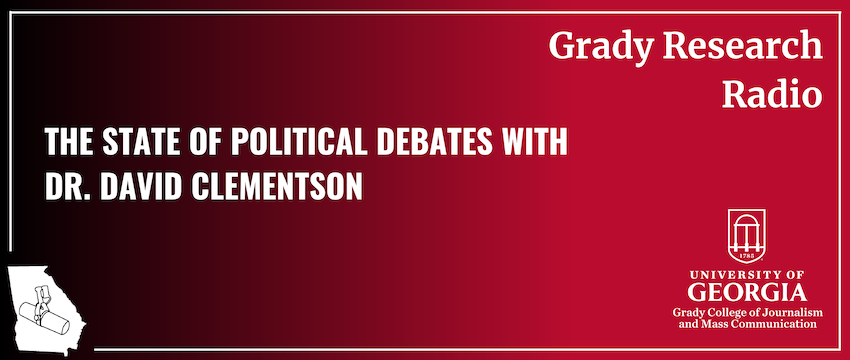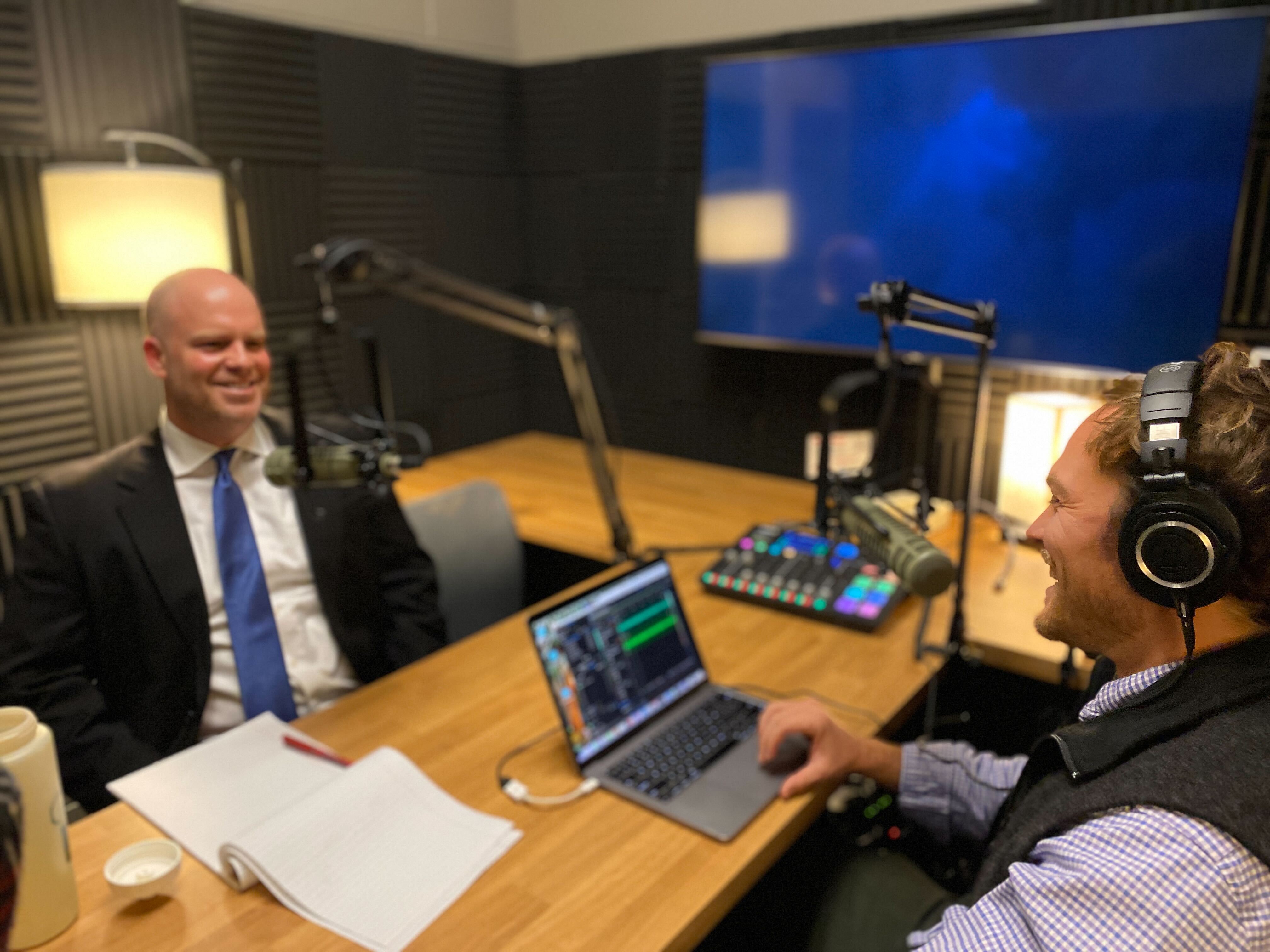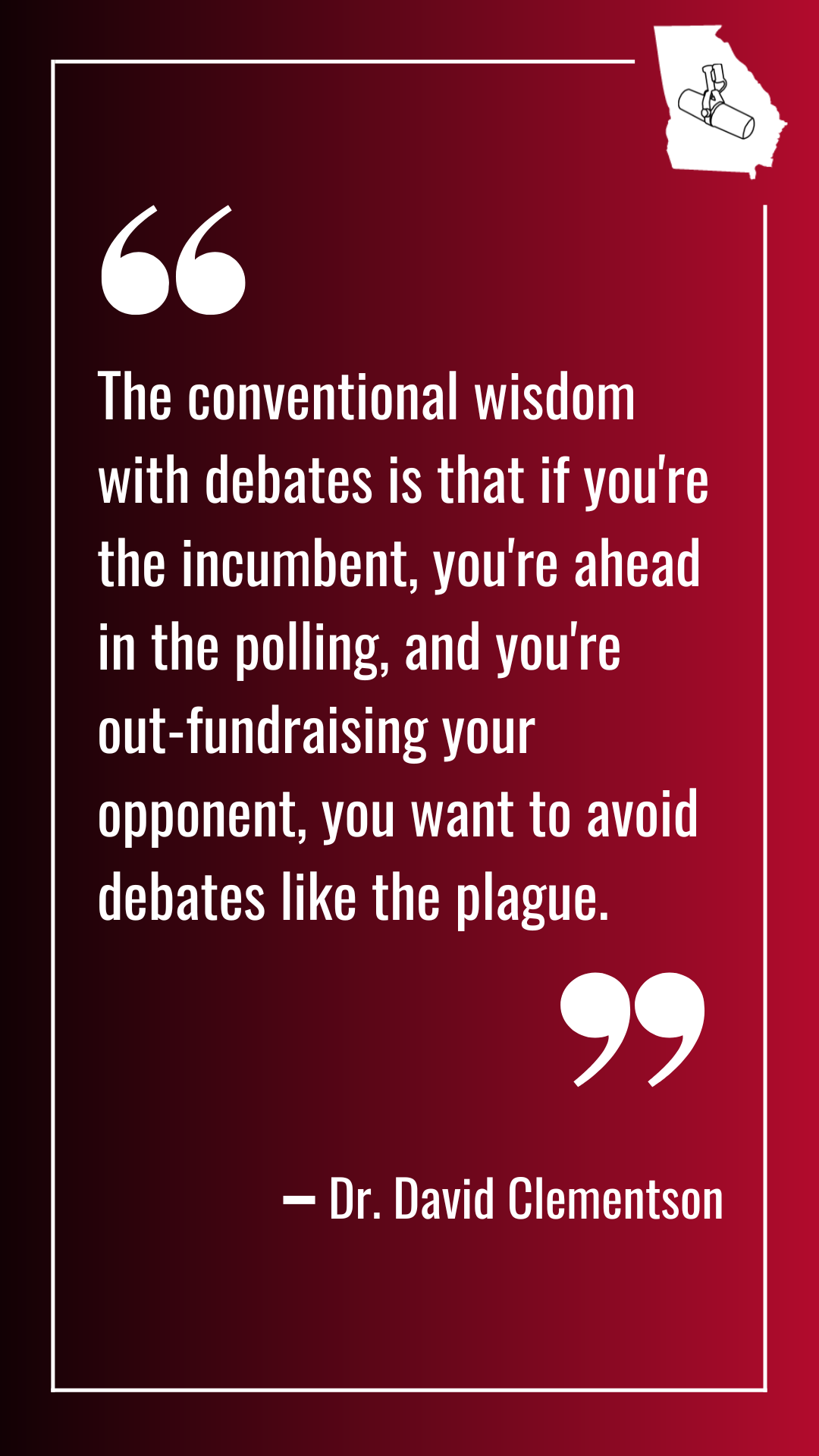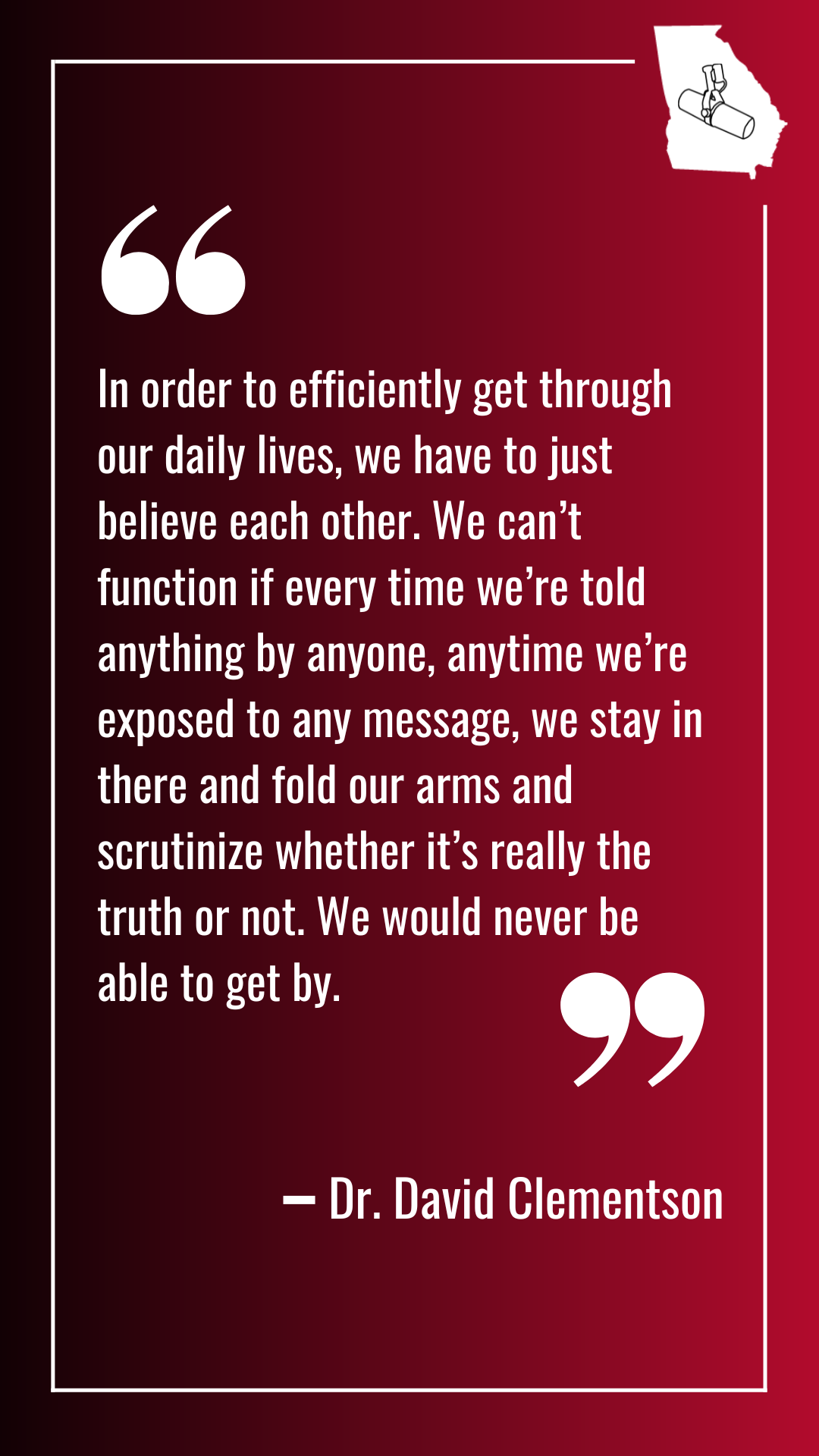Podcast: The state of political debates, with Dr. David Clementson

Podcast: The state of political debates, with Dr. David Clementson
Apple Podcasts/Spotify/Stitcher

Leading up to the 2022 general elections in the state of Georgia, the Grady Research Radio podcast recently had the opportunity to feature Dr. David Clementson, an assistant professor in Public Relations at Grady College and a political communication researcher.
In this interview, Dr. Clementson answers questions about the state of political debates, whether they have any real influence, why some politicians shy away from debates, the art of dodging questions and more.
Below is a transcription of the episode, edited lightly for clarity and brevity.
Grady Research Radio: I’m interested in debates and their influence, or lack thereof. Debates have seemed to have lost a little bit of their weight in recent years. Until about mid-September, Herschel Walker and Sen. Rafael Warnock didn’t even have a debate scheduled. Some races throughout the country don’t have debates at all. So my question is, what power do debates currently hold? Can they change minds, particularly in a race like the Warnock and Walker race, with the candidates so different ideologically?
David Clementson: Yes, so, debates are typically the most watched, most attended of any campaign event during a political season. If people are going to pay attention to anything, other than say a TV ad or YouTube ad that they can’t avoid, if they’re going to be exposed to any campaign discourse at all, it’s probably going to be a debate. So, yeah, in the specific context of this U.S. Senate race here in Georgia, the only debate that they’re scheduled to have is likely to be the most watched event of the whole campaign season, the number one thing that voters will be exposed to and would be affected by.

Now, secondly, for the candidates themselves, their main goal ought to be crystallizing, mobilizing and incentivizing their own supporters, because that’s really the biggest impact that a debate is going to have. It’s not going to change hearts and minds, most likely. It’s not going to really impact the ability to reach across the aisle and win over unaffiliated voters. Really, who they should be speaking to are their supporters, folks who are already inclined to be voting for them.
Now that’s really tough advice for a politician because, of course, politicians want everyone to love them. They want everyone on both sides of the aisle to see that they’re the most perfect human being ever. But, really the biggest effect you’re going to have is motivating your own base, your own supporters.
Now, granted, there could be Republicans and Independents inclined to support Warnock. There could be Democrats and Independents inclined to support Herschel Walker. But, really, their chief goal has to be focusing on people who are already inclined to support them.
Who is your base of support already? What did they want to hear you say? Research shows that you’re really not going to change hearts and minds. You may not even move the needle whatsoever, barring some unforeseen gaff or scandalous outburst. Really you have to stay laser focused on just crystallizing your own support.
Grady Research Radio: That’s interesting. So it’s mobilizing support. Is there a formula for the types of answers that candidates can give that mobilize all of their supporters? Because, you know, in some instances, one group of people may support you for X and another group of people may support you for Y. So, is there a formula that candidates follow that helps to mobilize voters in debates?
David Clementson: Yeah. It’s a great question. There’s this theory in our line of work called Equivocation Theory. It goes way back to 1988, and the first paper on it, in the Journal of Language and Social Psychology, was all about using equivocation, equivocal communication, in politics. The penultimate example of it was if you’re asked this no-win question, such as, do you support or oppose gun control. Now, that was their example of a no-win question back in 1988, and we see history repeating, because that’s probably the sort of question that they will be asked — a divisive, no-win question.
Now, according to Equivocation Theory, this kind of divisive question places the politician in what they call an avoidance-avoidance conflict situation, whereby any direct answer is going to turn off a sizable segment of your voting population. If you say, “Yes I support gun control,” you’ve just kissed away, you know, law-abiding, gun-owning citizens of Georgia who love their firearms. If you say, “I oppose gun control,” then you could be asked about, “What about the latest school shooting” and other sorts of limitations on gun control. So, you just can’t win if you answer a divisive question.
The way that you maneuver this kind of rhetorical minefield where you’ve got to appeal to 50 percent plus one of the voting electorate and you will be asked divisive questions, which will instantly offend large segments if you answer, is you equivocate. That’s the word for it. Equivocating, as defined in our social scientific and social psychological research, is to give a non-straightforward answer. You’re not going to give a direct answer. You’re not going to lie. You’re going to give an honest answer. But it’s going to skirt specifics.
So, you’re going to talk about what you support as far as gun control measures. If you’re speaking as a big fan of the Second Amendment and an NRA member, you might talk about what you would consider common sense gun control measures that keep automatic rifles out of the hands of felons or mentally ill people.
If you’re trying to talk about your support for gun control, you’ll focus on law-abiding citizens, but you have to equivocate. You have to give non-straightforward answers. I’ve done so much research into this very kind of thing, whether it’s in debates or just general media interviews. Equivocation is a brilliant maneuver for a strategic politician. It’s also referred to as strategic ambiguity.
It’s a brilliant maneuver if you’re good at it, and we’ll see if Herschel Walker is any good at it. This will be his first debate. Although, he has some experience giving interviews in the media.
But, yeah, that’s how you ride that fine line, by equivocating. And then, you magically can persuade diverse, opinionated segments of the electorate to think that what you said really spoke to them. It’s pretty cool. If done right, you’ll have people on polar opposites of a particular issue who think that you said things that, when you look later on the transcript, you didn’t actually say. It’s the power of equivocal communication.
Grady Research Radio: If that is done poorly, though, I do know that journalists, and voters in general, get on candidates for what many people refer to as dodging questions. But is that a smart approach for candidates? Does dodging questions ultimately have any negative impact on them in their debates?
David Clementson: So this raises a fascinating paradox of political communication, media relations and debates. On the one hand, there’s this overriding axiomatic assumption of political discourse in which we assume politicians dodge questions all the time. Most people think that you can’t get a straight answer out of a straight question with politicians. There’s the joke, you know, how do you tell if a politician is lying? His lips are moving.

So, on the one hand, if you ask them in a survey, “Are politicians deceptive? Do they dodge questions?” the electorate will say, “Oh, yeah. All the time.” But if you don’t ask them in that kind of way, you just show them a debate or you show them a media interview and then you have them tell you what they thought of it, they’re likely not going to volunteer the opinion that they detected deception. They’re certainly going to be really bad at accurately detecting whether, in fact, the politician was was deceitful in their answers in a debate or a media interview.
Now, a lot of that goes to what’s called a truth bias or truth default, in which humans, we have this innate tendency in our interactions with each other to assume we’re being told the truth. That’s called Truth Default Theory by Tim Levine at the University of Alabama, Birmingham.
What this means is, in order to efficiently get through our daily lives, we have to just believe each other. We can’t function if every time we’re told anything by anyone, anytime we’re exposed to any message, we stay in there and fold our arms and scrutinize whether it’s really the truth or not. We would never be able to get by. You couldn’t ever have a second date with someone if you were scrutinizing the veracity of everything.
So, voters, as I found in my own research, while we might say, “Oh, they’re going to be deceiving constantly, dodging all the questions, and they won’t give any answers in this debate,” in actuality, based on experiments I’ve run, the truth default will be in full effect during this Georgia Senate debate. Voters will be inclined to be receiving incoming information as being truthful. And my research has shown it even goes for partisan scenarios.
A Democrat watching Herschel Walker, unless they have had their suspicion triggered for some reason, they’re going to be receptive to what Herschel Walker is saying and have to then scrutinize it later for its it’s veracity. The same applies for a Republican watching whatever Warnock is saying in the debate.
The truth default is pervasive. It’s robust. People are going to be defaulting to the truth. And, of course, that’s a weapon that politicians can wield in the debate. The politician can actually exploit voters’ truth default, which enables them to either just make up falsehoods or, more likely, to be able to deflect questions with relative ease.
Grady Research Radio: Great. So the truth default is interesting. We assume that these politicians are telling the truth when we’re watching them in live action. But, a lot of news organizations airing these debates try to fact check in real time, and afterwards as well. A lot of journalists, or just general people, will go in and do their own fact-checking of answers to the questions. So, does inaccuracy in responses damage perception of politicians in voters’ eyes?
David Clementson: Yeah, so there’s a ton of research on the effectiveness of fact checks. There have even been meta-analyzes of whether fact checks work and, if so, how. One of the results in fact check meta-analysis has been that the more politically attuned someone is, the less efficacy fact checks have. So, conversely, if you’re less knowledgeable and involved in politics, a fact check will have more effect on you.
However, there’s that kind of catch 22 — if you’re uninvolved in politics and you’re not paying attention to politics or keeping up with the news, then are you really going to be exposed to a typical fact check, outside of a contrived artifactual research experiment?
So, fact check research is all over the place. Different findings. Different kinds of variables involved.
Partisanship is just so strong that a fact-check can even backfire, and a politician can use it to their benefit — that the, you know, “Liberal media has fact checked me, called me a liar pants on fire, and hasn’t even fact checked my opponent a single time.” That kind of thing can actually work to your benefit, as we saw with Donald Trump.
So, the effect of fact checks, yeah, if they’re live during the debate, and people are watching their Twitter feeds instead of watching the debate and seeing what various fact-checking organizations are saying, it can play a role in crystallizing preconceptions. If you entered the debate already supporting one candidate, you’re probably going to then, you know, retweet fact checks that are encouraging to your side and dismiss cognitive dissonance of fact checks that are skewering your side.
Grady Research Radio: Earlier, we were talking about dodging questions. Some candidates throughout the country, and here in Georgia, have attempted to or successfully dodged debates entirely. So, my question is, are debates typically a net positive for candidates in terms of gaining voters, or is there a good reason for candidates to avoid them?
David Clementson: So the conventional wisdom with debates is that if you’re the incumbent, you’re ahead in the polling, and you’re out-fundraising your opponent, you want to avoid debates like the plague.
So, interestingly, Raphael Warnock, at this moment, checks off all those three boxes, right? He’s the incumbent. He’s running for reelection. He’s way out-fundraising his opponent, and he has a slight lead in the polls. So, the conventional wisdom would be that, in this kind of scenario, Warnock would not want to have any debates and would be avoiding them like the plague.
Meanwhile, the candidate who has phenomenal name recognition and heroic status in the state but isn’t leading in the latest polls, is being outmatched in fundraising, and is the challenger, you’d think that he’d be wanting a hundred debates. He’d be calling on the incumbent, you know, to debate him every day and twice on Sunday. However, that’s flipped in this scenario.
It’s on a case-by-case kind of basis. In the Arizona governor’s race, you have one candidate not wanting to debate so much. In the Pennsylvania U.S. Senate race, you have one candidate not wanting to debate so much and Dr. Oz wanting to have more debates. Meanwhile, here in Georgia, we’ve got Warnock wanting a bunch of debates, and meanwhile, Herschel Walker showed up to zero debates. I don’t think he even showed up to any town halls or candidate forums with other opponents during the Republican primary. So, he hasn’t been vetted so much. He hasn’t gotten the reps.
And so the conventional wisdom is, you want to avoid being in the debate if you have a lot more to lose and very little to gain. Meanwhile, for whatever reason, that’s flipped in this situation.
Grady Research Radio: There are other instances throughout the country where politicians have outwardly stated that they don’t want to debate their opponents because they are too different ideologically, or they are conspiracy theorists. They just think it would be impossible to reason with their opponent. So, my question is, if we are separating ideologically and we’re getting further and further apart, do you think that will contribute to a potential downfall of debates in the future, or do you see us continuing to use debates as a tool?
David Clementson: Interesting. I hope that our love for debates doesn’t dissipate. But, yeah, I can see that. In the last presidential election, Biden and Trump only had two debates. Typically, they have three debates, and the vice president typically has one debate.
Here, in this general election for a nationally watched U.S. Senate race, they are only going to be having one debate.
Although, debates, in the grand scheme of things, in the history of political campaigns, they are a relatively new phenomenon.
There were the big, you know, 1960 debates with Kennedy and Nixon, and then there weren’t debates again for another like 15 years or something. I don’t remember exactly.
But, in recent memory, of course, we expect there to be debates, and it says something about our desire for good representative democracy. We want to see politicians up there having to answer questions spontaneously, off the cuff, straight from the heart, without other filters and handlers around them. And there’s something undemocratic about only giving scripted talking points in other settings instead of putting yourself up there for 45 minutes or 90 minutes for a debate.
So, it certainly is a winning issue, in terms of an informed electorate, for politicians to consent to debates and to participate in debates.
You know, but Herschel Walker managed to win the Republican nomination easily against, I don’t know, four or five Republican primary opponents without having any debate whatsoever. He was hammered for that by his opponents and by the media, and he still obviously won the nomination nonetheless. He and his handlers did a cost benefit analysis and decided, you know, it’s not worth the potential upside to put yourself up there for a risky primary debate.
But this is Herschel Walker. He’s quite possibly the most famous person in Georgia. Just because something works for Herschel Walker in Georgia, certainly we can’t extend that to apply to other politicians.
And, yeah, with the polarization, as you mentioned in your question, the electorate is so polarized. We’re exposed to totally different viewpoints, depending on what we’re reading and what we’re watching. Partisan divisions are just so strong, with the two sides just hating each other’s guts and practically living in different worlds.
Maybe a time in the not too distant future could come where it’s just a waste of time to even have a debate because they’re talking over each other and they’re quoting statistics that the other side didn’t even know about because they were never exposed to that form of political discourse.
Grady Research Radio: I wanted to go back to something you mentioned earlier and tie it into a different portion of this conversation. I, personally, am way more interested and more likely to tune in to primary debates, because that’s how I can separate candidates and actually make an informed decision about who in my party I would like to vote for. So, do candidates take a different approach to the primary debates than they would to the general election debates?
David Clementson: Yeah, so primary debates are more influential than general election debates. A primary debate really can have an effect on the electability and viability of a candidate, more so than a general election debate.
In the primary, the segment of the electorate that you’ve got to appeal to is far slimmer than in the general election, so candidates will tend to be more, I don’t know, inflammatory in throwing their red meat rhetoric to the base, right? Because they’ve got to set themselves apart from a bunch of other politicians who hold similar, if not identical, stances.
Like in the primary debates that just took place here in Georgia, you had several races in which the opponents had nearly identical voting records. If you went through their voting records and looked at, you know, what they’d supported and opposed in the Senate or the House here in Atlanta, they were identical. So, they have to set themselves apart on other stuff.
So, strategically, they’re going to be trying to come off as more impassioned or even more inflammatory, more divisive, throwing more red meat rhetoric to their base to set themselves apart.
Then let’s say they win the nomination. They immediately pivot to trying to appeal to a broader swath of the electorate, right? They’re going to moderate their stances to appeal to a more centrist segment. So, yes, strategically, they’re going to pivot to the general to try to appeal to more people.
Grady Research Radio: Great. Well, thank you for your time today.
David Clementson: My pleasure. Thank you.